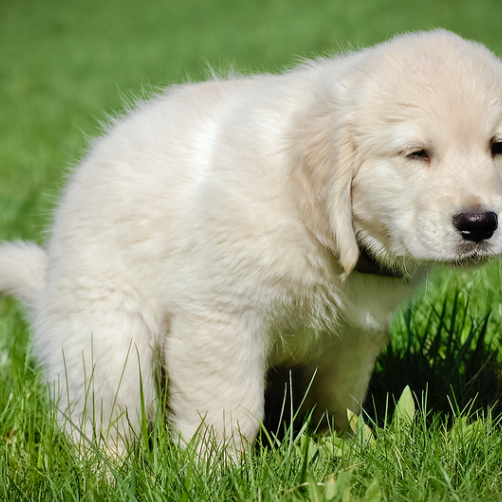Potty training your new puppy is likely to be one of the first things you do.
Sign up for a private training session if you want some customized help.
Potty training Rule 1: Reward your puppy for going outside!
Potty training begins with getting your puppy to pee, poop and urinate outside. We recommend that you pick a small patch of grass outside (if possible), and walk only there until your dog goes to the toilet.
Throw a party when they’re done!
Treats (or some of the kibble they eat) should be given as soon as your dog has gone potty. Do not wait until they have returned inside. If your puppy enjoys it, give lots of praise, petting, and excitement. Repeat this for the first few days and reward your puppy at least once a week.
This is the basis of potty-training.
How to manage your puppy during potty training
The puppies can only hold the bladder for a certain amount of time, and don’t yet have the ability to know when they should go. The management will prevent accidents and allow you to have the Potty Party that was mentioned in the step before.

Here are some tips for training your dog to avoid accidents in the home:
- You may have to take your puppy to the potty every hour when they are young.
- Keep your dog in view so that you can observe any pre-potty behavior. When they have to go potty, many puppies start circling, sniffing the floor, or becoming more restless and agitated. You need to be able notice these signs in time to get them outside! It may be best to keep your dog in an exercise pen or on a leash so that you can observe their behavior and take them out.
- Many people crate puppies overnight. A smaller space will discourage puppies from peeing or pooping on their own. However, very young puppies can’t hold it for long periods of time. You will need to let your puppy out frequently if you want them to be able to hold it.
- It’s possible that your puppy may forget to pee if they are overly excited. If they have been playing with a puppy or having fun, it’s important to get them outside again once they calm down.
- Maintain a regular routine! Keep a routine!
What Should I do if my puppy has an accident in the house?

Don’t panic if your dog has an accident!
Puppies have limited bladder control and may not even realize they are going to the bathroom until it is too late.
If your dog has had an injury:
- Cleaning up an accident is important. Use a pet odor removal spray to keep the spot from smelling “hmm… this smells like an ideal place to potty.” A thorough cleaning will also help.
- Consider the reasons why your dog may have had an incident. Was it because they needed to go out earlier? Was there a reason why they didn’t pee on their last outing? You missed the signs they needed to leave? You can do all of these things to avoid accidents in the future.
- Do not punish your puppy. We strongly advise against punishing your puppy by yelling, forcing them to put their face close to the accident, or putting them on timeout. The accidents that puppies have at this age aren’t intentional: they happen by accident. It’s not helpful to yell at them and make things worse.
When will my puppy be fully potty trained?
It’s a good question! This depends on the puppy. Even if the puppy has not had any accidents in the home by three months, there is sometimes a short regression between four and five months.
As they age, puppies are able to hold their bladder longer. A four-month-old puppy is usually able to hold it longer than an eight-week-old pup. It’s normal for a puppy to be unable to hold it longer than 3-4 hours, until they are older. Typically by 9-12 months puppies have a mostly-fully-developed system that allows them to hold it for 6 or more hours. Just like humans, most of us do not hold it for more than 8 hours on a regular basis except when sleeping.
Troubleshooting Potty training
I have an adult dog that is constantly peeing and has accidents in my house
It would be a good idea to visit the vet! Your dog may have a UTI, or another medical condition that affects their ability to hold the bladder.
When my dog or puppy gets nervous or excited, they may pee.
Some dogs are more susceptible to this problem than others. It’s better to make your dog feel calm and safe, rather than letting them get so excited or upset that they urinate!
I can’t understand why my puppy is having trouble with potty-training.
It can be frustrating! We recommend contacting a positive reinforcement trainer as soon as possible in order to figure out the problem and what can be done to help.
